Choosing a Site
Identify Current Problems
When no parking infrastructure is provided, bicyclists improvise and lock their bikes to anything that seems secure. This can result in damage to fixtures such as light posts and railings, as well as causing hazards to pedestrians. Most importantly, improvised solutions do not guarantee secure parking for riders.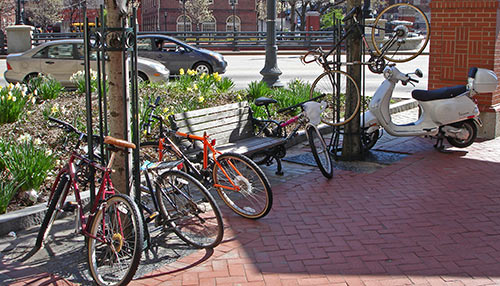
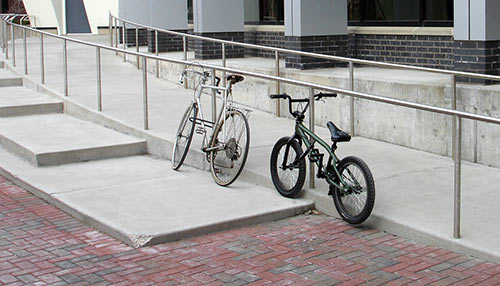
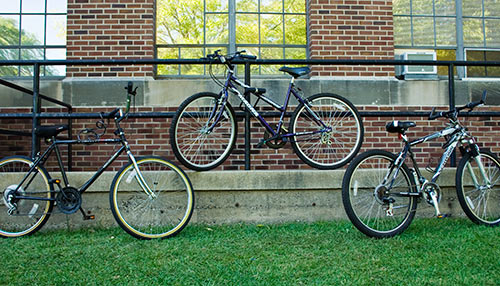
Make it Visible and Prominent
If bicyclists can’t find your bike rack, they won’t use it. We recommend placing a bike rack within 50 ft of an entrance or at least as close as the nearest car parking stall. Have the bike rack painted bright colors and use signage to direct bicyclists to the area you designate for bike parking.
Racks placed behind buildings or in other out-of-sight locations give thieves more time to work unnoticed.
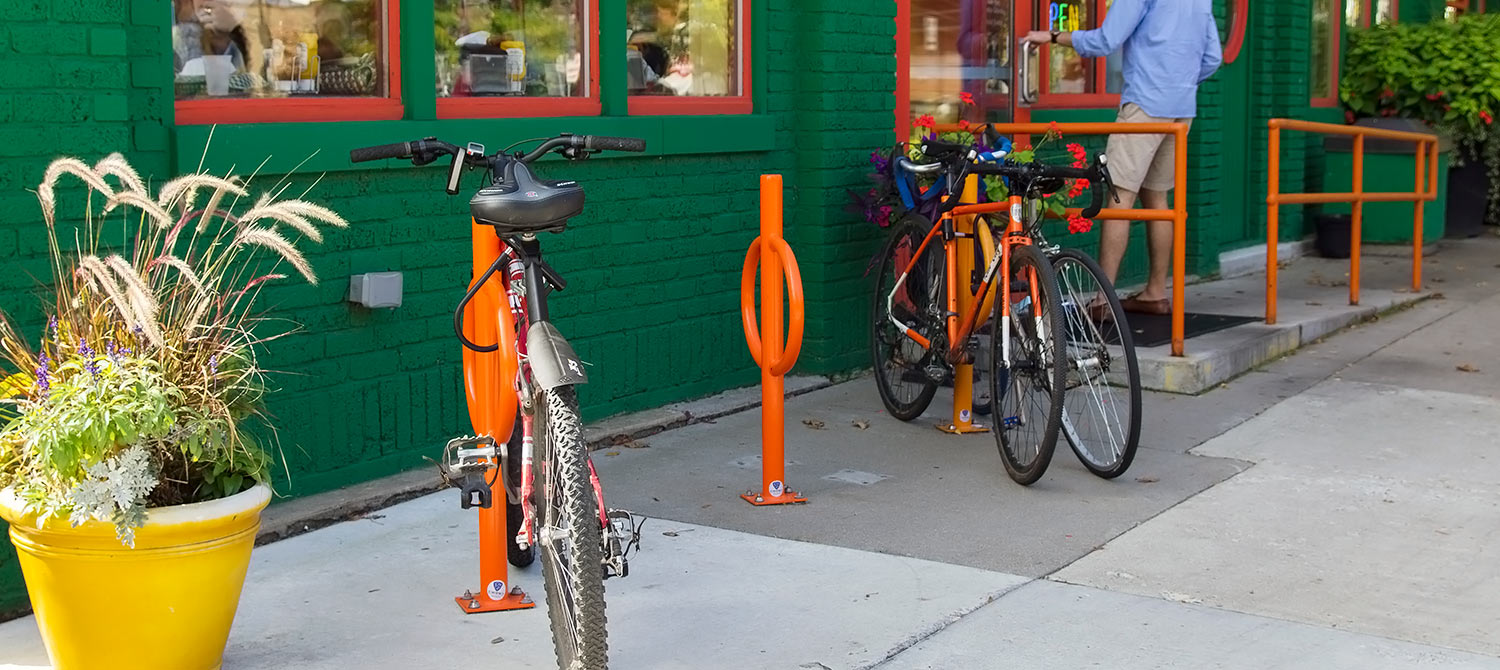
Space Use
Demand
How many bikes do you need to park at your business, office, or residential building? The easiest baseline way to answer this question is to contact your city or town government and confirm any minimum ordinances or mandates applicable.
Capacity and Space Use
Once the amount of parking has been determined, you will naturally need to ensure that adequate space is provided. Below there are several diagrams to show you how different bike parking systems fill a particular space with optimal spacing and setbacks.
For parking systems which park bikes vertically, the diagram below offers an approximate calculation for the space needed to park bikes.
A 20’x20’ area should be able to park about 60 bikes.
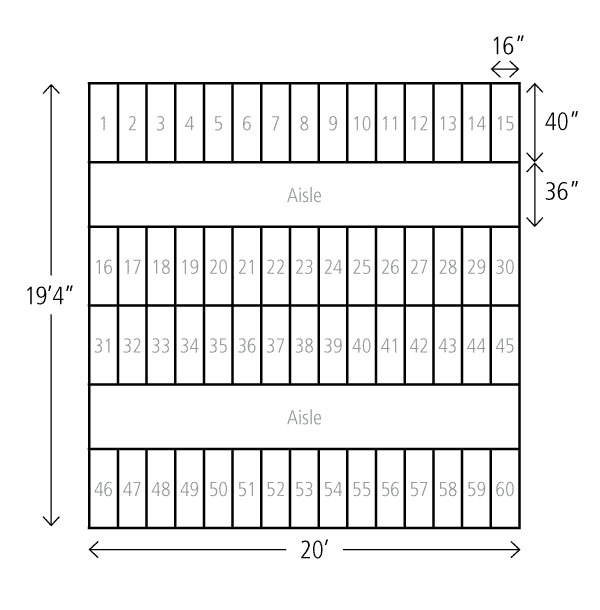
Setbacks
Of course, a bike rack can only park the maximum number of bikes if it is has proper setbacks from obstructions. Also, a bike rack shouldn’t obstruct other objects such as street furniture, access doors, or right of way.
Below are some general guidelines for setbacks. This illustration is based on recommendations by the District of Columbia Department of Transportation and the City of Minneapolis Department of Public Works.
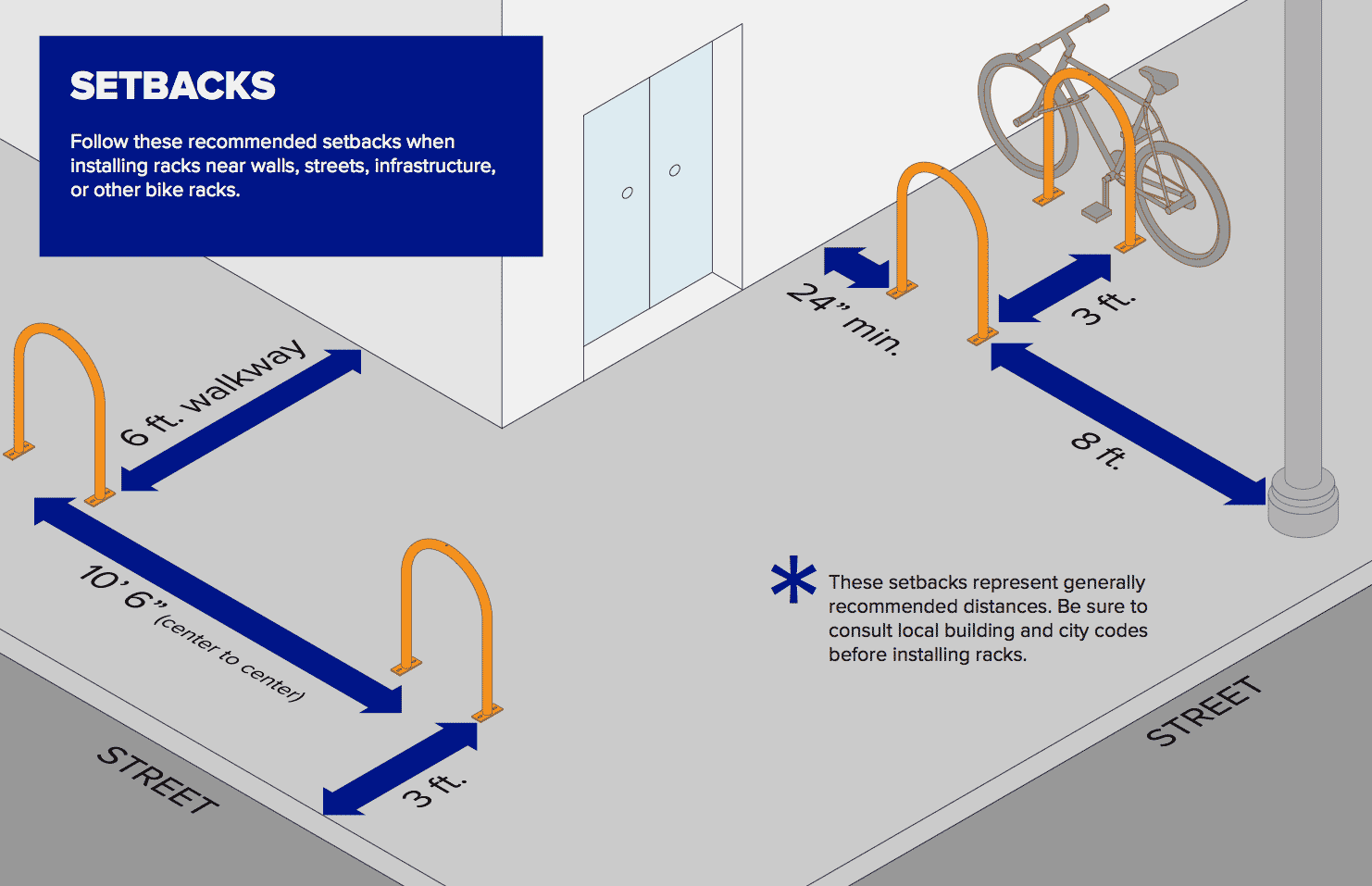
Installation Surfaces
 Concrete is the best and least expensive surface material for a variety of rack types and installation methods. Both in-ground and surface mounts work well on concrete and are easy to install.
Concrete is the best and least expensive surface material for a variety of rack types and installation methods. Both in-ground and surface mounts work well on concrete and are easy to install.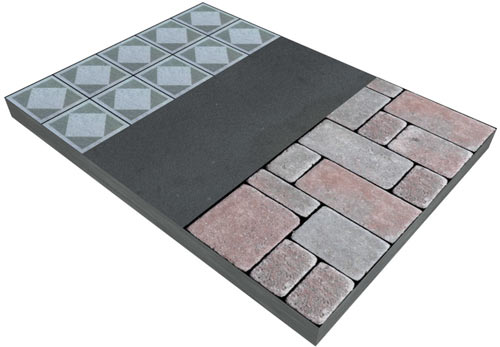
Other hard surfaces such as asphalt, pavers or tile may or may not be suitable for a surface- mounted option. Factors affecting the suitability of these materials include the thickness of the surface material, the makeup of the below-grade material, and climate. Freestanding racks are recommended for these surface types.

For organic materials such as mulch, dirt and grass, you will need a bike rack with a freestanding option, or you may pour concrete footings to anchor the rack down.
Let Your City Be Your Guide
Many cities and communities already have bike parking guidelines, ordinances, and even bike rack cost share programs. You can find answers to questions concerning required bike parking capacity, placement, and right-of-way. Check with your community’s website. Usually, bike parking information may be found within a city’s public works or parks and recreation department. Here are some city resources we have found.
Or go straight to the bicycle advocacy organizations who are on their bikes every day, and who know from first hand experience which areas could be more bicycle friendly. They can also give advice on their preferred style of bicycle rack. Below are websites of several city and state bicycling organizations in the United States.
Choosing Your Racks
Security
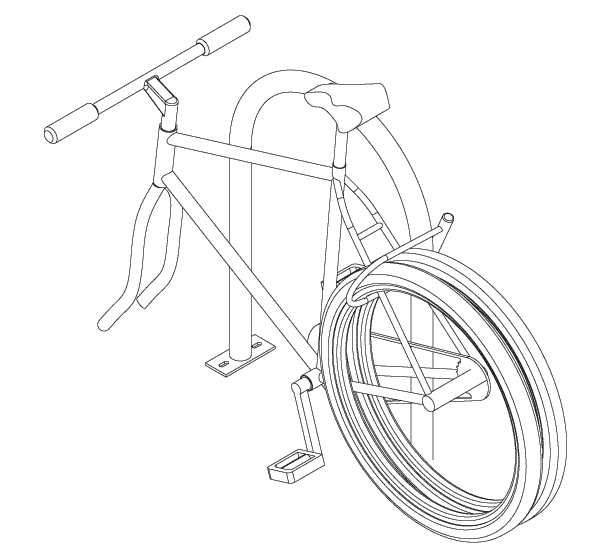
With well over a million bicycles stolen every year in the United States and the increasing sophistication of today’s bikes, security is by far the most important issue for bicyclists. Some bikes can cost several thousand dollars, so people want to be sure that when they lock their bike up it will still be there when they return.
We highly recommend that people use u-style locks to secure both the wheels and frame of their bike, since cable locks are flimsy and easy to cut. Be sure the rack you chose is u-lock compatible if there is open access to the bikes.
Of course, knowing how to lock your bike properly is just as important as the lock you choose. Remember to securely fasten wheels (especially if you have quick-releases) as well as the frame.
Good Bike Frame Support
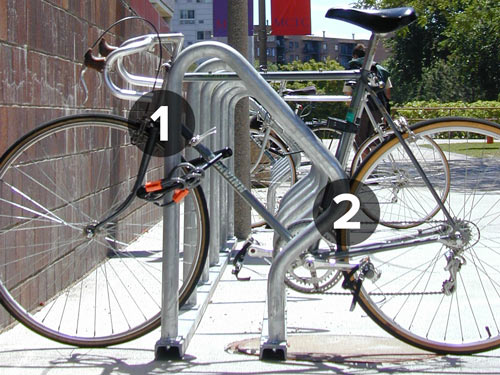
Good support
If you are looking to encourage bicyclists, racks that support the frame in at least two places are ideal.
Browse Products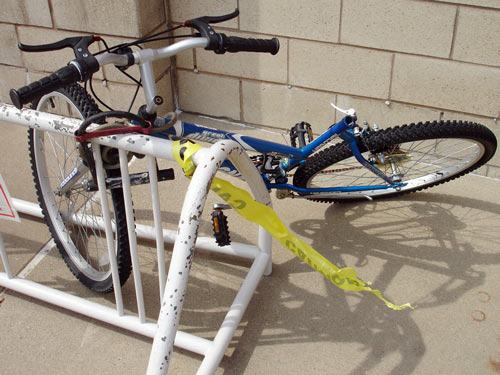
…and not so good
Many standard “grid-style” racks support only the wheel, leaving the bicycle vulnerable to damage – hence the nickname “wheel bender.” Also, bicyclists often drape their bikes over the top bar to allow locking with a u-lock.

Wave Style Racks
Wave style racks are U-lock compatible and cost effective, but are not optimal for bicyclists because they do not provide two points of contact with the frame. Bicycles often end up tipping over and are packed too tightly together.
Consider Unique and Creative Solutions

Bike Shelters
Many communities and campuses are finding that covered bike parking encourages people to travel by bike. Shelters offer outdoor bicycles more protection from the elements than uncovered racks. A shelter’s canopy keeps rain, snow, and sun off of bikes and their riders. Shelters also help with LEED certification.
Browse Bike Shelters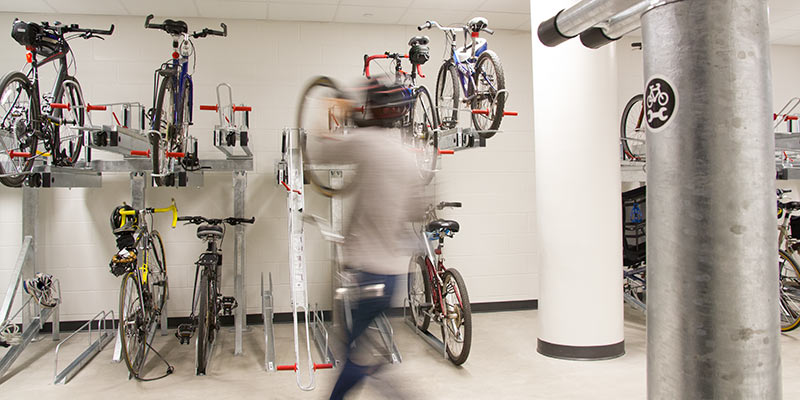
Bike Rooms
Bike rooms provide a great opportunity for high security, long-term bike parking when there is not place outside to put shelters or lockers. Dedicated indoor bike storage rooms are praised by cyclists for residential and commercial use.
View Bike Room Design Guide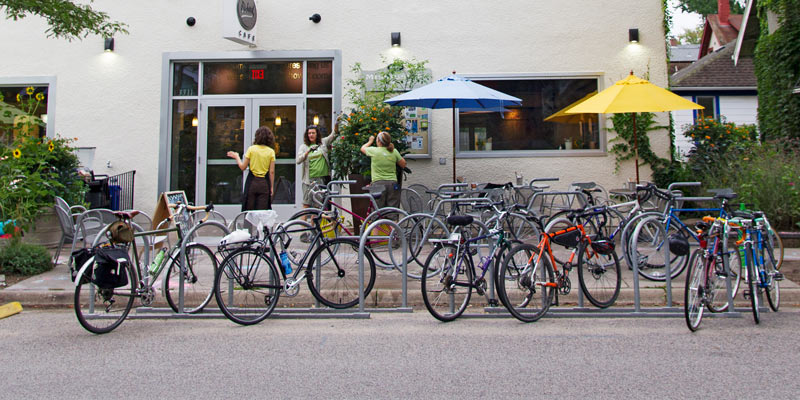
Bike Corrals
Several communities have begun implementing on-street solutions for bike parking. New York City, Portland, OR, Santa Barbara, CA and Minneapolis, MN have all removed car parking spaces to provide additional bike parking. This solution is ideal in high density areas with small sidewalks and moderate pedestrian traffic. Portland’s program has been so successful that businesses have begun requesting removal of car parking in favor of bike parking in front of their stores and offices.
Browse On-Street Bike Parking
Temporary Parking
Often overlooked, event parking is a critical building block for bicycle friendly communities. State fairs, music festivals, and sporting events draw hundreds or thousands of attendees. Yet, many organizers often forget the bike parking altogether, leaving cyclists stranded and area parking lots overcrowded. Some cities, such as San Francisco, have passed mandatory minimums for valet bike parking at events. Successful bike parking at events also contributes to a venue’s overall green image.
Browse Temporary Bike ParkingAesthetics
Who said bicycle racks had to be ugly? Several bike rack manufacturers are producing racks that could easily qualify as street art. A well-designed bike rack enhances the visual appeal of the area in which it is placed. Though custom racks cost more than a standard bike rack, the returns on your investment include heightened visibility and improved public perception of your organization’s values.
Browse Custom Bike Racks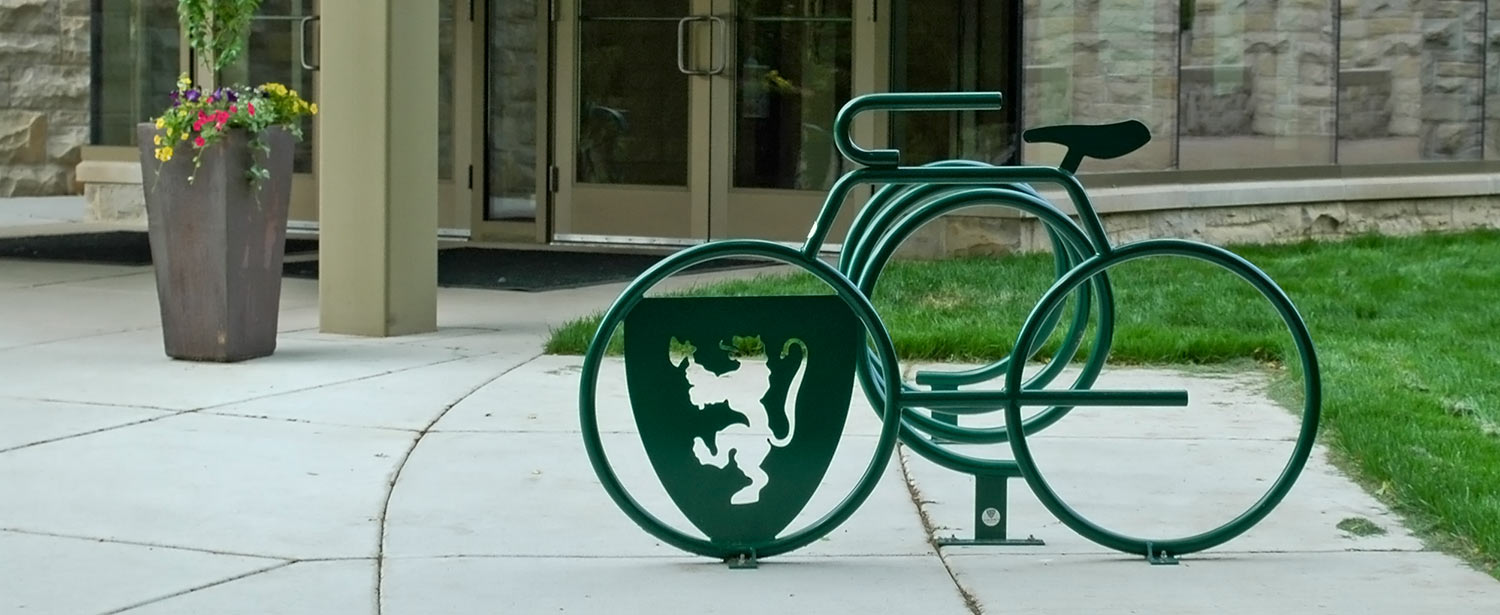
Additional Resource:
The Association of Pedestrian and Bicycle Professionals (APBP) has its comprehensive “Bicycle Parking Guidelines” available for purchase here.

 Surface Mount: Metal flange anchors to the ground with included wedge anchors. Other special anchors such as tamperproof nuts are also available.
Surface Mount: Metal flange anchors to the ground with included wedge anchors. Other special anchors such as tamperproof nuts are also available.
 In-ground Mount: Rack is embedded into concrete surface
In-ground Mount: Rack is embedded into concrete surface
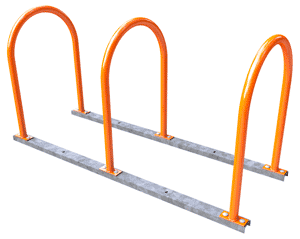 Rail Mount: Racks are bolted to rails which may be anchored to surface or left free-standing
Rail Mount: Racks are bolted to rails which may be anchored to surface or left free-standing







